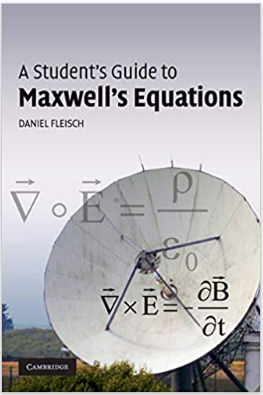Maxwell's equations are some of the most important things that you will learn if you are taking physics and/or working on an electrical engineering degree. They basically describe the concepts of electricity and magnetism, which apply to things like the power to our homes and semiconductor chips that are in every single device we own. Unfortunately, a lot of the textbooks (both physics and EM engineering textbooks) give them a bit of short shrift, giving a basic explanation and maybe deriving one or two of them, but do not give a good explanation of why they are useful and, thus, what they represent can be lost on students.
This is a small book (about 130 pages) that covers all four equations, one per chapter. That breaks down what each equation represents and what the variables in the equation mean and provides both the integral form of the equations and the differential form. I think the best way to use this guide is to supplement your textbook material so that when you get to the point in the textbook where one of the equations is discussed, use this to flesh out the theory behind the equations that your textbook may not cover (or cover in as much detail). To be clear, this is not something like "Maxwell's Equations for Dummies" or something like that, which assumes you have little to no background going in. You do need to have some understanding of calculus (if you have taken multivariable calculus, that will definitely help because there is a lot of discussion of surface integrals and vectors), and know some of the physics concepts you will learn before getting to the electricity and magnetism topics (which is covered in the second semester of physics). So, if you are taking calculus-based physics and/or have to take an electricity and magnetism class (electric and magnetic fields) as a part of an engineering program, this will be very useful. It is probably overkill for those who just have to take algebra-based physics because it will go way beyond what you will be exposed to in class or expected to learn.
This is a small book (about 130 pages) that covers all four equations, one per chapter. That breaks down what each equation represents and what the variables in the equation mean and provides both the integral form of the equations and the differential form. I think the best way to use this guide is to supplement your textbook material so that when you get to the point in the textbook where one of the equations is discussed, use this to flesh out the theory behind the equations that your textbook may not cover (or cover in as much detail). To be clear, this is not something like "Maxwell's Equations for Dummies" or something like that, which assumes you have little to no background going in. You do need to have some understanding of calculus (if you have taken multivariable calculus, that will definitely help because there is a lot of discussion of surface integrals and vectors), and know some of the physics concepts you will learn before getting to the electricity and magnetism topics (which is covered in the second semester of physics). So, if you are taking calculus-based physics and/or have to take an electricity and magnetism class (electric and magnetic fields) as a part of an engineering program, this will be very useful. It is probably overkill for those who just have to take algebra-based physics because it will go way beyond what you will be exposed to in class or expected to learn.

No comments:
Post a Comment
Note: Only a member of this blog may post a comment.